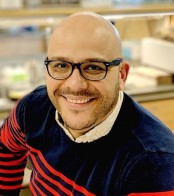 Miguel Angel Brieño-Enríquez is an Assistant Professor at Magee-Womens Research Institute, University of Pittsburgh. Research in the Brieño-Enríquez lab focuses on the regulation of gametogenesis in mammals (human, mouse and naked mole-rat) and, more specifically, the fundamental mechanisms that are required to produce viable germ cells. His studies include the analysis of how ageing and environmental factors disrupt gametogenesis and how these defects are transmitted to other generations. Dr. Brieño-Enríquez has been an Editorial Board Member for Scientific Reports since 2022.
Miguel Angel Brieño-Enríquez is an Assistant Professor at Magee-Womens Research Institute, University of Pittsburgh. Research in the Brieño-Enríquez lab focuses on the regulation of gametogenesis in mammals (human, mouse and naked mole-rat) and, more specifically, the fundamental mechanisms that are required to produce viable germ cells. His studies include the analysis of how ageing and environmental factors disrupt gametogenesis and how these defects are transmitted to other generations. Dr. Brieño-Enríquez has been an Editorial Board Member for Scientific Reports since 2022.
 Pawel Kordowitzki is an Assistant Professor at the Institute of Veterinary Medicine, Nicolaus Copernicus University in Torun, Poland. His research focuses on female reproductive ageing, especially on telomeres, mitochondria, and DNA methylation processes within the oocyte. He aims to understand how to slow down or postpone the ageing process in oocytes of advanced age women, to answer a long-standing question: why do oocytes age and why so early in life. Dr. Kordowitzki has been an Editorial Board Member for Scientific Reports since 2022.
Pawel Kordowitzki is an Assistant Professor at the Institute of Veterinary Medicine, Nicolaus Copernicus University in Torun, Poland. His research focuses on female reproductive ageing, especially on telomeres, mitochondria, and DNA methylation processes within the oocyte. He aims to understand how to slow down or postpone the ageing process in oocytes of advanced age women, to answer a long-standing question: why do oocytes age and why so early in life. Dr. Kordowitzki has been an Editorial Board Member for Scientific Reports since 2022.
 Mellissa RW Mann is an Associate Professor at the Magee-Women’s Research Institute and the Department of Obstetrics, Gynecology and Reproductive Sciences at the University of Pittsburgh Medical School. Her research investigates molecular mechanisms that regulate gene expression during embryo development, focusing on the effects of assisted reproductive technologies on genomic imprinting as well as the regulation of imprinting across imprinted domains. Dr. Mann has been an Editorial Board Member for Scientific Reports since 2017.
Mellissa RW Mann is an Associate Professor at the Magee-Women’s Research Institute and the Department of Obstetrics, Gynecology and Reproductive Sciences at the University of Pittsburgh Medical School. Her research investigates molecular mechanisms that regulate gene expression during embryo development, focusing on the effects of assisted reproductive technologies on genomic imprinting as well as the regulation of imprinting across imprinted domains. Dr. Mann has been an Editorial Board Member for Scientific Reports since 2017.

